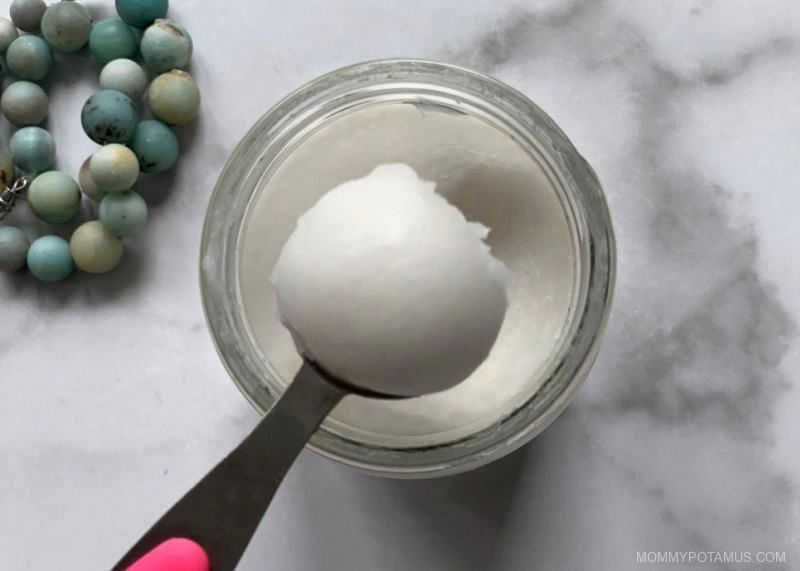
Can a 3,000 year old Ayurvedic practice whiten your teeth, reduce bad breath, detox your body and make unicorns appear? I haven’t been able to find studies to support all of those claims (though I’m really holding out for the unicorn one), but there is scientific evidence that coconut oil pulling may:
- Reduce oral bacteria that contributes to tooth decay and gum inflammation
- Counteract bad breath
- Support overall oral health, which is linked to gut health and cardiovascular health
- Decrease plaque formation, which can make teeth look dingy and yellow
We’ll dive into the details in just a moment, but first I want to mention that none of these statements have been evaluated by the FDA, this article is not medical advice, and it is not meant to diagnose or treat any condition. Now that we’ve got that out of the way, let’s dive in.
What is oil pulling?
Hippocrates once said that “All disease begins in the gut,” but we don’t usually give much thought to where the gut starts – the mouth. As ethnopharmacologist Cass Nelson-Dooley puts it in this fascinating interview:
If we think of the gastrointestinal tract as a river, then the mouth is the headwater, the source of that river. It sets the stage for everything that comes after in the gastrointestinal tract and in the whole body.”
There are hundreds of microorganisms living in our mouths. Many of them are friendly – like this strain that supports ear, nose and throat health. Others . . . not so much.
The bacteria that make up our oral microbiome – both good and bad – form biofilms on our teeth and gums called plaque. A little plaque is normal, but excessive plaque buildup can lead to problems including gum inflammation, bad breath and tooth decay.
Also known as“kavala” or “gundusha,” traditional Ayurvedic oil pulling involves swishing or “pulling” about a tablespoon of oil throughout your mouth for 20 minutes or so. It’s usually done on an empty stomach and there are a few other details that you need to know before getting started – which I’ll cover in a step-by-step guide below – but here’s how it helps with biofilms:
- Most of the microorganisms that live in our mouth are single cell organisms that are wrapped in a lipid (fatty) membrane.
- When oil is swished around your teeth and gums, the outer fatty membranes of the microorganisms are drawn to it like a magnet. Thanks to this effect, pockets of microbes are sucked out of their hiding places and become suspended in the liquid. (1)
- When you spit out the oil in the trash can, you manually remove these microbes. Certain oils, such as coconut oil, also appear to selectively inhibit the growth of certain types of harmful bacteria, which may help to balance the oral microbiome in favor of the friendly guys.
The Problem With Antibacterial Mouthwash
Often touted as “Bad for bacteria, good for gums,” antibacterial mouthwash doesn’t discern between good bacteria and pathogenic bacteria.
That’s a problem, because we swallow about one trillion bacteria everyday – a process that is “continuously seeding the gastrointestinal tract with bacteria.” (2) For example:
H. pylori can be a very stubborn infection to get rid of. It turns out that H. pylori lives in dental biofilms in the mouth. When people had dental cleanings, they were less likely to get reinfected with H. pylori. This is just one example of how bacteria in the stomach and gastrointestinal tract are directly influenced by the bacteria in the mouth. When patients have chronic gastrointestinal dysbiosis, it may be originating in the mouth, and they should be evaluated for periodontal disease.” (2)
Unfortunately, the broad-spectrum approach taken by antibacterial mouthwash may exacerbate the issue. According to this article in Scientific American, “wiping out too many of the mouth’s native bacteria” with alcohol-based mouthwashes “could disrupt the usual checks and balances, making way for opportunistic species responsible for gum disease and other infections to move in and take over.”
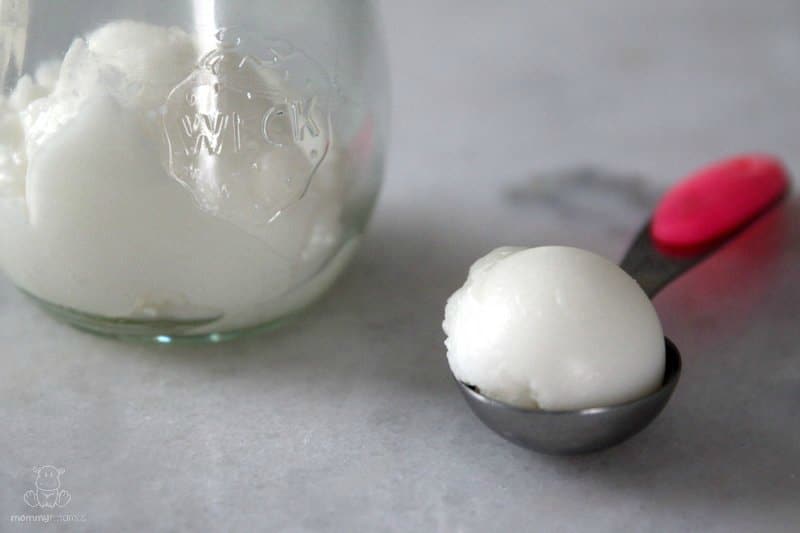
Health Benefits of Coconut Oil Pulling
Oil pulling is an easy, inexpensive way to support a balanced oral microbiome naturally. Here are some of the top benefits:
1. Reduces Bacteria That Contribute To Tooth Decay
According to researchers from the Athlone Institute of Technology in Ireland, coconut oil mixed with enzymes that simulate digestion “strongly inhibited the growth of most strains of Streptococcus bacteria including Streptococcus mutans — an acid-producing bacterium that is a major cause of tooth decay.”
Other studies have found that coconut oil works as well as chlorhexidine – an ingredient found in some mouthwashes – and should be explored as a safe alternative. (3) In this one, swishing for just 10 minutes a day significantly reduced Streptococcus mutans within two weeks.
Also, this study found that fatty acids found in virgin coconut oil were helpful for balancing yeast in the mouth.
2. Improves Gum Health
As I mentioned above, the microorganisms that make up our oral microbiome create biofilms, aka plaque. While a little is normal, excessive plaque buildup can cause something called plaque-induced gingivitis, aka gum inflammation.
In several studies, oil pulling decreased plaque formation after a period of 1-4 weeks (depending on the study). (1)(4)(5)(6)
3. Helps With Bad Breath
When excess bacteria are present in the mouth, they release large amounts sulfur compounds that cause halitosis (bad breath). Unfortunately, the usual “fix” recommended for this doesn’t work:
According to many experts, mouthwash does not eliminate bad breath. The mouthwash works at first — killing lots of germs. Then, the bad news. Tierno says that the bad breath you wanted to prevent gets even worse. He says the alcohol content present in many mouthwashes can dry your mouth out. When the saliva glands are dry, they are unable to help wash away bacteria so the stinky stuff flourishes.”
On the flipside, several studies have concluded that regular oil pulling reduces the excess bacteria that contribute to oral malodor without drying out the mouth. (7)(8)(9)
4. May Support Overall Health
A good oral care routine may support overall cardiovascular health. According to ethnopharmacologist Dr. Nelson-Dooley notes that, “In people with coronary artery disease, simply beginning an oral hygiene program reduced their cardiac events.”
On the flipside, “One study showed that using mouthwash eliminated the beneficial effects of healthy oral bacteria and raised blood pressure.” (2)
Oral health also directly impacts gut health. As mentioned above, we swallow about 1 trillion microbes per day – a process that profoundly impacts our gut microbiome.
While regular brushing, flossing and dental cleanings are the foundation of oral care, oil pulling may be helpful as well. More research is needed to determine whether it has measurable systemic benefits.
5. May Whiten Teeth
People who oil pull regularly often report that it whitens teeth naturally. While no studies have been done to confirm this effect, some do mention it as a likely benefit. (10)
Plaque can make teeth look dingy and yellow, so it’s possible that the ability of oil pulling to decrease plaque formation may be the reason for the perceived whitening effect.
Which oil is best?
The most commonly used oils are:
- Coconut oil
- Sesame oil
- Sunflower oil
- Olive oil
Ideally the oil you choose would be cold-pressed because it’s the method that best preserves antioxidants. My top choice is coconut oil because it’s rich in lauric acid, an anti-inflammatory fatty acid that has been shown in studies to make conditions less friendly for unwanted microrganisms like Escherichia vulneris, Enterobcater spp., Helicobacter pylori, Staphylococcus aureus, Candida spp., including C. albicans, C. glabrata, C. tropicalis, C. parapsilosis, C. stellatoidea and C. krusei7, S. mutans and C. albicans. (1)
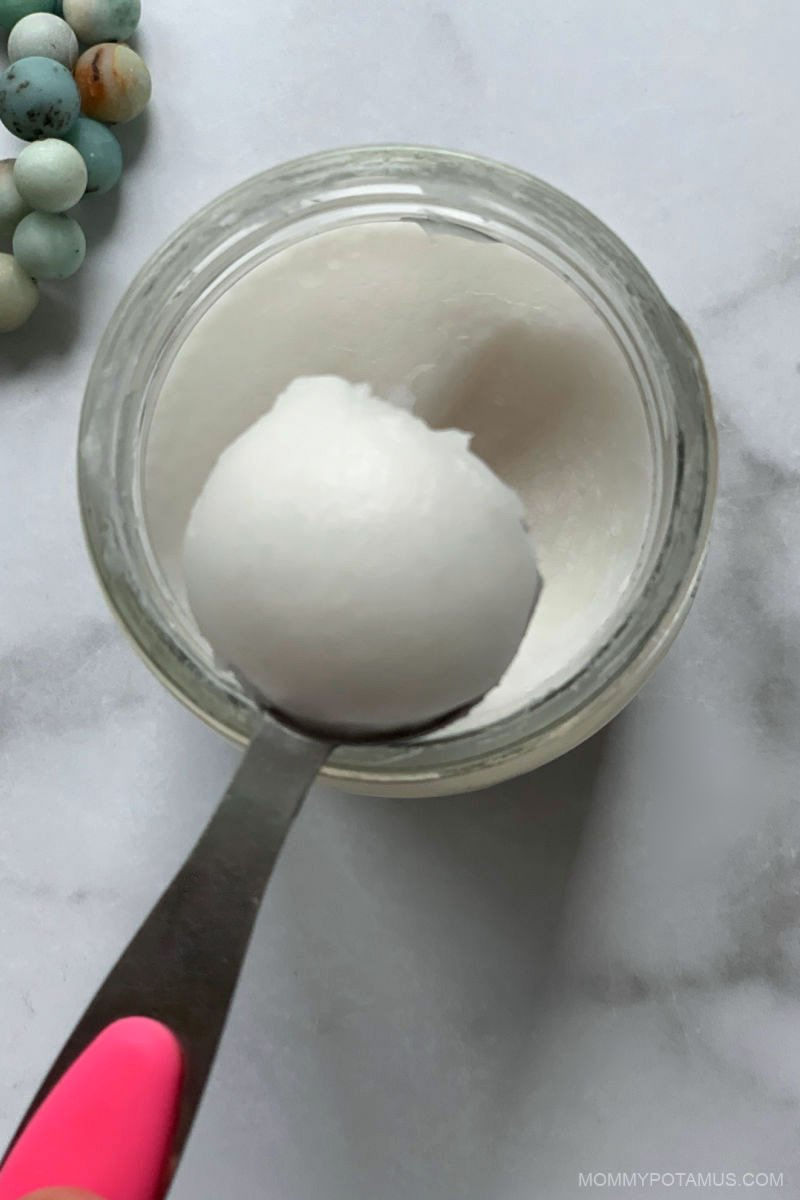
Step-By-Step Guide To Coconut Oil Pulling
- Place about a tablespoon of virgin coconut oil in your mouth and begin swishing it all around. If you’re finding it difficult to hold the oil in your mouth without swallowing some, spit some out in to the trash and try a smaller amount.
- Gently swish the oil for 5-20 minutes. Longer is typically considered better, but do what works best with your schedule.
- When you’re done, spit the oil into the garbage. Don’t swallow it or spit it into the sink/toilet.
- Before eating or drinking anything rinse your mouth with warm water. Purified water or water that has been mixed with mineral-rich sea salt are both good options. Mineral-rich saliva contributes to tooth remineralization, which is a normal biological response to ongoing demineralization from acidic foods, etc. (11) (12)
Most guides to oil pulling suggest brushing your teeth immediately. However, newer recommends often say to brush beforehand so that the anti-inflammatory compounds in the oil are able to maintain longer contact with the mouth after a session.
Personally, I opt to brush and floss before oil pulling.
Tip: Want to simplify your routine and include a healthy, natural whitening ingredient in your oil pulling regimen? Check out this post on making coconut oil pulling chews with teeth whitening turmeric.
Frequently Asked Questions
When unfriendly bacteria try to work synergistically together in the mouth, they communicate via quorum sensing. Oils such as clove, cinnamon, spearmint, peppermint and myrrh may promote healthy flora balance in the mouth by regulating quorum sensing. (13)
Generally, a 1-2% dilution (3-6 drops in one tablespoon coconut oil) is considered appropriate, but according to Essential Oil Safety, cinnamon leaf and clove leaf should not be used at a dilution higher than 0.6% (about 7 drops in four tablespoons coconut oil). Clove bud should not be used at a dilution higher than 0.5% (2 drops in 1 tablespoon plus 1 teaspoon coconut oil).
This Healthy Mouth blend is pre-diluted to 2% and can be used as-is to brush with or added to coconut oil to swish with.
According to this study, “It is contraindicated for children below 5 years due to risk of aspiration,” aka accidentally breathing food or fluid into the lungs. (10) In children over five, they mention that a teaspoon of oil is the most common amount used. Talk with your healthcare provider before incorporating this practice with children.
Yes. As long as it’s fresh when purchased, coconut oil has a shelf life of about two years. Essential oils, on the other hand, tend to oxidize sooner. Make sure to use essential oils that have been purchased relatively recently and are stored properly in a cool area out of direct sunlight. Keep your oil pulling mixture stored into the same conditions (cool area out of direct sunlight) and use within three months.
How To Do Oil Pulling With Coconut Oil
Ingredients
- 1 tbsp virgin coconut oil
Instructions
- Place about a tablespoon of virgin coconut oil in your mouth and begin swishing it all around. If you're finding it difficult to hold the oil in your mouth without swallowing some, spit some out in to the trash and try a smaller amount.
- Gently swish the oil for 5-20 minutes. Longer is typically considered better, but do what works best with your schedule.
- When you're done, spit the oil into the garbage. Don't swallow it or spit it into the sink/toilet.
- Before eating or drinking anything rinse your mouth with warm water. Purified water or water that has been mixed with mineral-rich sea salt are both good options. Mineral-rich saliva contributes to tooth remineralization, which is a normal biological response to ongoing demineralization from acidic foods, etc.
Notes
Want more research-backed natural remedies?
No problem, I’ve created a free ebook for you – Kitchen Apothecary: 25+ Natural Remedies Using Ingredients From Your Pantry – as a gift for signing up for my newsletter. You’ll also get updates when I post about safe essential oils for pregnant/breastfeeding mamas, exclusive gifts and coupons (I was able to give away a jar of free coconut oil to anyone who wanted it recently!), plus other goodies.
Sign up using the form below.
Sources
1. Peedikayil, Faizal C. et. al. (2015) Effect of coconut oil in plaque related gingivitis — A preliminary report
2. Burhenne, Mark (2020) The Oral Microbiome & Its Impact on Every Other System in the Body
3. Peedikayil, Faizal C et. al. (2016) Comparison of antibacterial efficacy of coconut oil and chlorhexidine on Streptococcus mutans: An in vivo study
4. Nagilla, Jithender (2017) Comparative Evaluation of Antiplaque Efficacy of Coconut Oil Pulling and a Placebo, Among Dental College Students: A Randomized Controlled Trial
5. Asokan, Sharath et. al. (2009) Effect of oil pulling on plaque induced gingivitis: a randomized, controlled, triple-blind study
6. Hv, Amith et. al. (2007) Effect of Oil Pulling on Plaque and Gingivitis
7. Asokan, Sharath et. al. (2011) Effect of oil pulling on halitosis and microorganisms causing halitosis: a randomized controlled pilot trial
8. Sood, Poonam (2014) Comparative Efficacy of Oil Pulling and Chlorhexidine on Oral Malodor: A Randomized Controlled Trial
9. Faisal S Sheikh and Ramya R Iyer (2016) The effect of oil pulling with rice bran oil, sesame oil, and chlorhexidine mouth rinsing on halitosis among pregnant women: A comparative interventional study
10. Shanbhag, Vagish Kumar L. (2017) Oil pulling for maintaining oral hygiene – A review
11. Karlinsey, Robert L (2012) Remineralization of Eroded Enamel Lesions by Simulated Saliva In Vitro
12. Danielle Rulli, RDH, MS, DHSc and Elizabeth I. Pitts, RDH, MS (2018) Saliva’s Role in Remineralization
13. Khan, M S A et. al. (2009) Inhibition of quorum sensing regulated bacterial functions by plant essential oils with special reference to clove oil

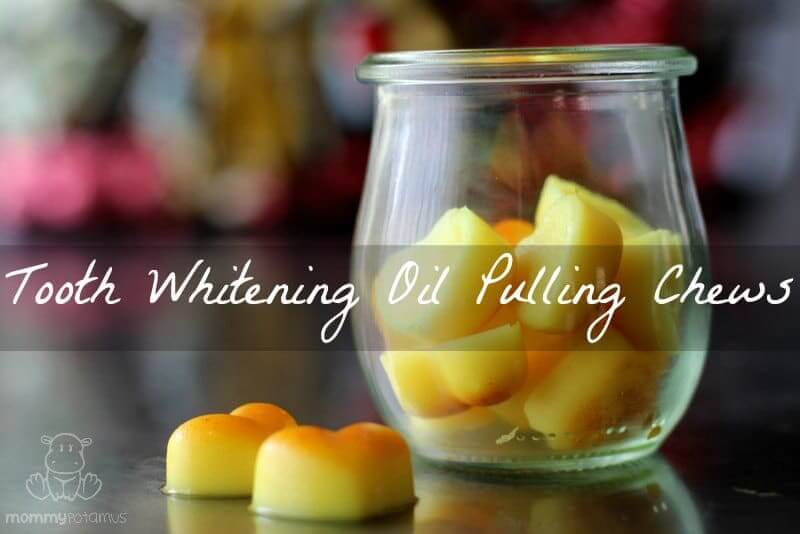
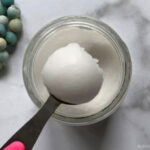
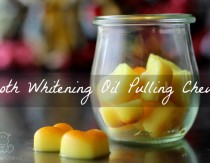
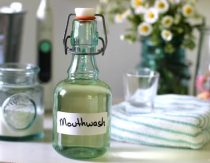
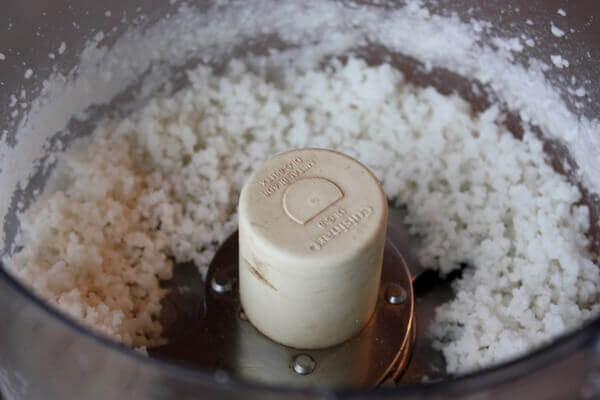

Looking forward to the next post the discloses the whitening agent and simplifying oil pulling. How soon til that post is up??
I’m shooting for this week 🙂
Even if you can only get 1-2 tsp. of coconut oil in it is better than none! I have still seen great benefits
I’ve never read anything about oil pulling and fillings. I’d like to do it, but have lots of the old ‘metal’ fillings.
I have heard that oil pulling can loosen fillings. Is this true?
I have been oil pulling twice a day. 20 minutes each time. I have found that my fillings actually feel stronger. The more I oil pulled the better my teeth felt.
I’ve been pulling since 2013 and love it. Mouth always feels super clean. Usually pull betw 1-10 min without looking at clock. I’ve read the importance of NOT swallowing the oil once u r swooshing as bad bacteria gets in your gut & can cause serious havoc so beware of this simple health note.
Is it ok to oil pull while breastfeeding or pregnant?
Just a thought..my dental hygienist is from India. She always said that turmeric was responsible for never being able to get teeth really white. She felt that the health benifits out weighed this however. Hmmm?
I do enjoy your blog for many readons, Thank you.
That’s interesting. I’ve been using it personally for quite awhile and have had the opposite experience. 🙂
What’s the “pulling” about? What did I miss?
I’m interested in the ‘coconut oil mixed with enzymes’ deal. Would that be any enzyme tablet? Crushed and added to the oil?
I’ve been trying to do research on this regarding breastfeeding and amalgam fillings. I’ve had mixed results showing yes and no for doing so. Any help in this area for good sources? Thanks!
Can you substitute MCT oil or fractionated coconut oil for the coconut oil?
Other liquid oils such as sesame are also used so I would think so, although I don’t think the lauric acid content would be the same.
Respected Madam, I have started oil pulling with unrefined, extra virgin, organic coconut oil from today. Today my first day, I started with oil pulling for 2 times although I could only manage for 4 minutes each time. My doubt is that daily as soon as I awaken, before even brushing my teeth, I first intake 645 ml of water then only do the bathroom routine. You have mentioned in your blog, that coconut oil pulling should be done as soon as one awakens, before eating and drinking anything. Does this mean ordinary water also? As the 645 ml of water should be drunk on an empty stomach, the first thing in the morning as soon as one awakens for it to be effective. And I have been doing this for some months now, and I do not want to stop it because of the coconut oil pulling regimen. Or can I first drink the 645 ml of water, then do the oil pulling, then brush my teeth, and then intake other things? Please advise me I am really looking forward to your esteemed responses. Thank you very much in advance.
Hi heather
coconut oil apparently has a negative impact on certain “important” gut microbes which can be mitigated with a high vegetable diet but none the less its a problem that we could probably do without in the big scheme of things.
So its clearly “anti bacterial” much like an “antibiotic mouthwash”, so how is this even beneficial to our oral microbiome in the first place if we are only replacing one nuke with a another type of nuke which is only going to cause microbe diversity problems down the track?
interesting article though, good read.
kind regards
Jamie
Based on what I’ve read, it seems that coconut oil is “selective” in its impact, much the essential oils mentioned in the post function via quorum sensing. Is there a study you have come across which states otherwise?
can I ask my bother of age 7, to do this?
yes, i think I have had a similar experience, sadly.. anyone else?!
I have several dental probably mercury fillings. Is it still beneficial for me to do this or will it cause me to get more heavy metal absorption? :0(
I have a mouth fill of mercury fillings…am 63 yo…in 2018 had scans done with a kinesiologist and totally shocked I had no mercury…only aluminum. One year on Medical Medium healing protocols to heal celiac/IBS, parasites, numerous food intolerances…that includes diet change, detox protocols and heavy metal detox smoothies…am free of aluminum and parasites! I have always brushed my teeth with coconut oil and often oil pulled. I thought the oil may pull more mercury out, but not so according to my scans.
I oil pull at bedtime, it’s just more convenient for me. I’ve been doing this for about one yr. I had upper teeth implants put in about 3 years ago, I also had receding gums on my lower teeth. Since oil pulling I have seen the receding gums coming back, it is amazing! I also feel that it has strengthened the implants and teeth in general, they feel much stronger and healthy
Thank god we have finally dropped the whole “oil pulling detoxes the entire body”. I’ve always wondered where that ever started. Cleasing the mouth, yes. Detoxing “all the sins” from the body, really? Thanks for publishing what we truly know about oil pulling!
I’ve been doing it for 18 Days and Something that it is not clear for me is: do I brush my teeth with toothpaste or with out? And then rinse with warm water and mineral/sea salt BEFORE or AFTER Oil pulling?
I enjoy your blog a lot 😃
THANK YOU!
Where do I get coconut oil for my mouth.
Mommy P. During chemo last year I had terrible, painful mouth-sores. My cancer team recommended a “magic mouthwash” which was anything but magic. It felt like I was swishing novocaine and then I would spit out, be unable to speak for several minutes-the numbness would go away and the pain would return. After some research I tripped upon oil pulling-and it was literally a life saver. I could again eat and get through a day without excruciating discomfort. At the worst I was pulling 2, sometimes 3xs a day, but once the inflammation in my mouth settled down, once a day was enough.